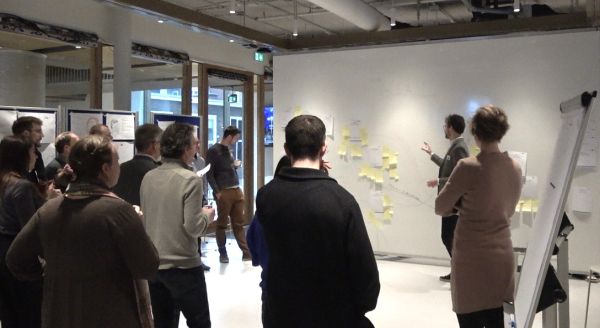Interdisciplinary project on sustainable urban logistics (GLEAM NSR) has started
All partners in the project GLEAM NSR, led by the University of Groningen, met this week for the official kick-off at the university’s House of Connections. The project focuses on the role of urban governance towards just and green urban logistics. The EU funds the project within the framework of the Interreg North Sea programme. In this project, sustainable logistics expert Paul Buijs and spatial planning expert Ward Rauws join forces on behalf of the University of Groningen.
As cities increasingly recognize the urgency of sustainable transformation, they are moving from setting ambitious policy goals to taking action. Paul Buijs (associate professor at UG’s Faculty of Economics and Business): “This shift reveals inherent tensions, as environmental stewardship and social inclusion need to be in balance with economic prosperity. Logistics is among the various facets that cities need to navigate in this transition.” The GLEAM NSR project specifically elevates the role of SMEs in urban logistics, working towards governance structures that support their transition in the evolving landscape of urban logistics.

Scaling solutions
In response to the complex challenge of urban logistics, cities have initiated experiments to explore more sustainable logistics solutions. Efforts such as facilitating and using consolidation hubs, parcel lockers, cargo bikes, and the implementation of low-emission and time-access-restricted zones have been instrumental in paving the way towards reducing the negative impact of logistics in urban areas. These experiments have been relatively modest and could benefit from policy and regulatory frameworks to ensure their widescale and long-term adoption. There is a growing realisation that these initial steps, while valuable, need significant scaling up and broader integration the urban fabric and city life.
Ward Rauws (associate professor at UG’s Faculty of Spatial Sciences): “In essence, the transition towards sustainable urban logistics is about how to govern public space. Logistics are key for cities to function well, but they also come with externalities. These externalities go beyond air pollution and nuisance. It also include which functions and users of public space get priority and where synergies can be created, especially for SMEs. Therefore, I am very pleased with the opportunity to add the spatial planning perspective to this consortium and continuing the joint work with Buijs in the ULaaDs project ."
The project consortium
GLEAM NSR is an interdisciplinary project led by the University of Groningen, on behalf of the university, the Faculty of Economics and Business and the Faculty of Spatial Sciences are both involved. The project consortium further includes 5 local authorities (Aarhus, Le Havre Seine Metropole, Leuven, Mechelen and Rotterdam), 2 policy partners (LNC and Copenhagenize), 2 industry partners (VIL and SMEunited), and 1 other knowledge partner (University of Gothenburg).
Questions? Please contact Paul Buijs or Ward Rauws .
| Last modified: | 01 February 2024 4.11 p.m. |
More news
-
11 March 2025
East Groningen: universal basic services must be up to standard
Sjierdan Koster makes the case for long-term thinking and for bringing Groningen’s universal basic services up to standard.
-
05 March 2025
Women in Science
The UG celebrates International Women’s Day with a special photo series: Women in Science.
-
11 February 2025
Verbeelding in Verandering - hoe om te gaan met verandering en te komen tot een inclusiever gesprek over het platteland van morgen
Het Nederlands landelijk gebied staat voor een groot aantal ruimtelijke opgaven, bijvoorbeeld op het gebied van klimaat, waterkwaliteit, agrarisch landgebruik en leefbaarheid in dorpen. Hoe de benodigde transities gezamenlijk vorm te geven is een...
